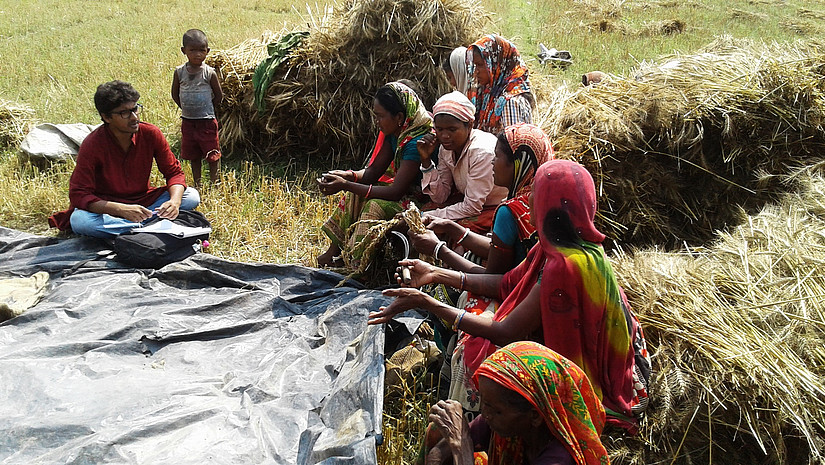Research 2015-2019
This research agenda deals with the concept of production chains, considering its relevance for decent work. While the opportunities and constraints of economic upgrading are frequently examined, social aspects or the prospects of social upgrading, i.e. improving the working conditions of employees and/or the positive effects on conditions for their families, have received less attention. The research project tackles the questions of whether and how social upgrading is a precondition for economic upgrading.
The research cluster contains the following research projects:
Research Projects
The majority of informal employment in the agrarian sector of the global South does not only go hand in hand with low productivity and low income but is usually also characterized by a lack of social protection for the informal workers by the state or other social organizations. Against this background, this research agenda is concerned with the opportunities and problems presented by a promising strategy for enhancing the living and working conditions in the informal sector: the sector-specific, trade union-like organization of workers to establish member-based social security systems – a development that has been supported by governments, trade unions, and informal workers for the past couple of years.
Research Project
Due to the rise of commodity prices, extractivist development models have returned to the political agenda in the 2000s. On the one hand, the growth they have brought has been used e.g. for progressive social policies in Latin America. On the other hand, these development models remain highly problematic both ecologically and economically. Little is known in this context regarding the significance of extractivist growth models for improving working conditions or productivity progress. The projects in this research area therefore mainly focus on the issues: How do (neo-)extractivist growth models promote or impede such improvements and progress? How are these growth models determined, implemented, and steered? What kinds of policies and regulations are required in order to achieve economic and, most importantly, social upgrading in extractivist sectors?
Research Projects
- Neo-Extractivism: Labor Relations & Productivity - UCC & Unicamp, Brazil
- Pilot Study: The Boom in Artisanal Gold Mining & its Effects on Rural Agricultural Livelihoods in Ghana: A Case of Ayanfuri Mining Enclave
- Development of Energy Efficient e-pedelec Rickshaw for Income Generation of Rural Community Through Quality and Easier Milk Handling - UAF, Pakistan & Kassel, Germany
The strong ecological, social, and economic dependency of cities on their surrounding regions had not been sufficiently investigated for a long time. This is also true of analysis relating to the change of land use and livelihoods through urbanization as well as the implications of urbanization for rural agrarian ecosystems.
Research projects in this thematic area explore what impact spatial, ecological, agrarian, economic, and social changes to rural-urban linkages have on the poverty of affected people, using case studies from Asia, Africa, and Latin America.
Research Projects
- Women's Empowerment for Sustainable Rural Livelihoods: Voices from Ghana, Pakistan & Kenya – joint project between UCC, Ghana, UAF, Pakistan, and EGU, Kenya
- Urbanization of Agricultural Land, Fodder & Dairy production & Resource Use Efficiency at the Rural-urban Interface in Pakistan & India – coordinated by UAF, Pakistan and TISS, India
- Rural-Urban Linkages in Comparative Perspective: Labour & Land in Ghana & South Africa – coordinated by UCC, Ghana and WITS, South Africa
- Peri-Urban Regions of Accra and Bangalore: Changing Structure of Economic, Social and Financial Paradigms – joint project between UCC, ISEC (Institute for Social and Economic Change), India and Kassel, Germany
Development cooperation can be a vital instrument in implementing the UN Sustainable Development Goal 8, but it also carries the risk of overlooking any conflicts of interest related to it. Seemingly simple solutions, such as facilitated market access, an increase in investments or advancement of technology frequently lose sight of complex social realities. While progress in production may result in improvements in the working and living conditions for some, it may lead to the deterioration of these conditions for others. This circumstance calls for research perspectives that will identify the different positions, needs, and interests in development cooperation. Researchers working in this area develop such research perspectives, drawing on case studies from development cooperation, not least aiming at devising strategies for ‘empowerment’ in this field. The project is a collaboration between UCC (Ghana), TISS (India), UADY (Mexico), and the University of Kassel (Germany).
Research Projects
- Analysis of the Effect of Socio-Productive Development Programmes on the Local Biocultural Heritage & its Implications on Decent Work through a Political Ecological Perspective
- Development-induced Displacement and Accountability in Development Aid
- Post-Development: Decolonial Alternatives to Development

